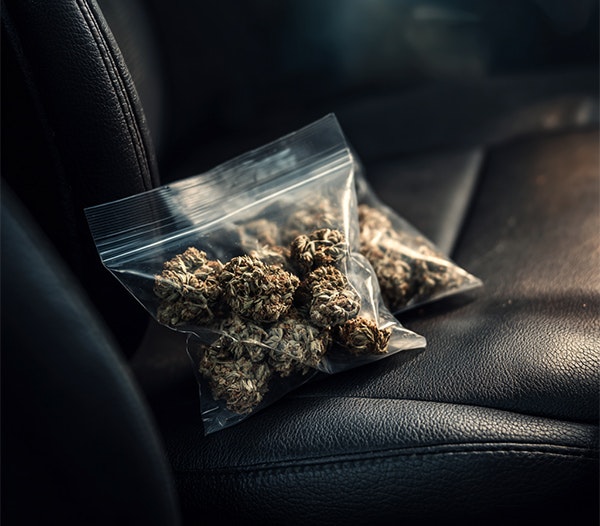Marijuana DUI Lawyer Tucson, AZ
Defending Your Rights in a Changing Legal Landscape
- Free, confidential consultations with an experienced attorney
- Certified specialist in Criminal and DUI Defense on your side
- Science-based defense strategies to challenge tests and police methods
Recreational Marijuana Is Legal
Driving Under the Influence Is Not
Arizona voters legalized adult recreational marijuana in 2020, but that doesn’t mean driving after using cannabis is risk-free.
For most other drug DUIs, simply having the substance in your system can be enough for a charge. When it comes to marijuana, impairment must be proven, and proving it is far from simple.
That difference matters because it creates opportunities for our DUI defense lawyers to challenge the evidence. THC can remain in the body long after the effects wear off, and today’s tests can’t reliably measure real-time impairment. A criminal defense attorney in Tucson, AZ, can use this gap to fight the case against you.
Why Tucson Trusts Us
Certified counsel: Joseph P. St. Louis is a certified specialist in Criminal Defense (Arizona State Bar) and in DUI Defense (National College of DUI Defense). He trains other lawyers nationwide on forensic science and trial strategy.
Proven courtroom results: Our team has represented clients in more than 200 jury trials. Ryan Huffman achieved three consecutive not-guilty DUI verdicts in less than two months.
Former prosecutor insight: Attorney Liz Farkas once led the Vehicular Crimes Unit for the Pima County Attorney’s Office, so she knows how to creatively build and systematically deconstruct DUI cases. Her experience gives clients a powerful advantage when facing complex criminal charges.
Direct attorney access: You’ll work directly with the attorney handling your case from your free consultation onward, not a paralegal or intake staffer.
Transparent, flat fees: We quote clear, flat fees for most DUI-related matters, and we’ll maintain a trust account for expert or investigative costs so you know exactly where your money goes.

Our Testimonials
“Mr. Joe St. Louis worked extremely diligently and fought for me to get me the best results! I can truly say that I entered their office devastated by my situation but can now continue my life and career happily with a successfully won case.”
— Cerina, 5-Star Review
The Challenges of Proving Marijuana Impairment
Unlike alcohol, there is currently no reliable test that can correlate THC levels to impairment while driving. Blood or saliva tests can detect THC days after use, but that’s long after any effect on a driver’s ability has passed.
Designed decades ago to estimate alcohol intoxication, field sobriety tests have repeatedly been shown not to reliably measure cognitive impairment from THC.
Our team will use this scientific reality to challenge the prosecution’s evidence at every stage.

Penalties and Consequences That Come With a Conviction

A conviction for marijuana DUI in Tucson can carry serious penalties:
- Jail time and steep fines
- Mandatory drug education or treatment
- Driver’s license suspension or ignition interlock device (IID) requirements
- Higher insurance premiums and a permanent criminal record
Prosecutors must prove impairment, so cross-examining lab analysts, challenging police procedures, and explaining the science to a jury are critical to your defense. This is where our legal team in Tucson stands out.
Our Approach to Marijuana DUI Defense
Frequently Asked Questions About Marijuana DUI in Tucson, AZ
Is it illegal to drive with marijuana in my system if I’m not impaired?
No, prosecutors must prove actual impairment. THC can remain in your blood for days, but that alone isn’t enough for a conviction.
What if I have a medical marijuana card?
A card allows you to possess marijuana, but it doesn’t permit impaired driving. The State still has to prove you were affected, even to the slightest degree.
Do I have to take a blood test?
You can refuse, but Arizona’s implied consent law can trigger an automatic one-year license suspension. We can challenge whether the officer had probable cause or properly explained the consequences of refusing the test.
Can a marijuana DUI be dismissed?
Yes, it can. St. Louis Huffman Law has secured dismissals and not-guilty verdicts in cases involving weak evidence of impairment and constitutional violations.
Protect Your Future Today
A marijuana DUI charge in Tucson is a criminal case with real penalties. The prosecution must prove you were impaired, and that gives a skilled defense team the leverage to fight for a dismissal or reduction.
Your freedom and driving privileges deserve a defense built on science, experience, and relentless advocacy. Request a free consultation to speak directly with an attorney who understands both the science and the law behind marijuana DUI cases.

Hear From Our Clients
“Best Lawyers in town! If you want someone to represent you with years of experience look no further. Everyone there is extremely knowledgeable, professional but more importantly they treat you with dignity and respect.”
— Alexander, 5-Star Review


